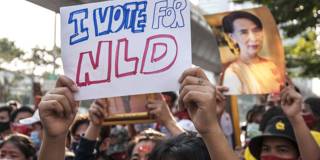Although Myanmar’s democracy was clearly a work in progress, that progress has now come to a jarring halt with the February 1 military coup. The country’s neighbors are treading warily in its aftermath, and there may be some curious reversals of earlier stances.
NEW DELHI – Until recently, the last time Myanmar’s military supervised a general election whose outcome it didn’t like was back in 1990. On that occasion, a military junta refused to recognize the results, arrested the democratically elected leaders of Aung San Suu Kyi’s overwhelmingly victorious National League for Democracy (NLD), and continued to rule the country via the State Law and Order Restoration Council (SLORC).
The same thing happened again on February 1, when Suu Kyi, now the country’s de facto leader, and other politicians, including NLD ministers, were arrested in a pre-dawn swoop. The military took charge, declared a one-year state of emergency, and promptly transferred power to the army’s commander-in-chief, General Min Aung Hlaing. Vice President Myint Swe, a former general, was named president, but yielded power to Hlaing.
Once again, Myanmar’s men in uniform, who ruled the country from 1962 to 2011 and had co-existed with civilian leaders in a slowly unfolding political transition over the last decade, have made clear their distaste for democracy. Last November’s general election resulted in another landslide victory for Suu Kyi’s NLD, which won 396 of 476 contested parliamentary seats and limited the army’s proxy political front, the Union Solidarity and Development Party, to just 33.

NEW DELHI – Until recently, the last time Myanmar’s military supervised a general election whose outcome it didn’t like was back in 1990. On that occasion, a military junta refused to recognize the results, arrested the democratically elected leaders of Aung San Suu Kyi’s overwhelmingly victorious National League for Democracy (NLD), and continued to rule the country via the State Law and Order Restoration Council (SLORC).
The same thing happened again on February 1, when Suu Kyi, now the country’s de facto leader, and other politicians, including NLD ministers, were arrested in a pre-dawn swoop. The military took charge, declared a one-year state of emergency, and promptly transferred power to the army’s commander-in-chief, General Min Aung Hlaing. Vice President Myint Swe, a former general, was named president, but yielded power to Hlaing.
Once again, Myanmar’s men in uniform, who ruled the country from 1962 to 2011 and had co-existed with civilian leaders in a slowly unfolding political transition over the last decade, have made clear their distaste for democracy. Last November’s general election resulted in another landslide victory for Suu Kyi’s NLD, which won 396 of 476 contested parliamentary seats and limited the army’s proxy political front, the Union Solidarity and Development Party, to just 33.